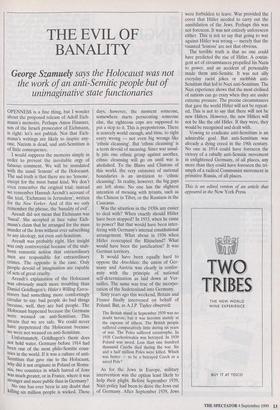THE EVIL OF BANALITY
George Szamuely says the Holocaust was not
the work of an anti-Semitic people but of unimaginative state functionaries
OPENNESS is a fine thing, but I wonder about the proposed release of Adolf Eich- mann's memoirs. Perhaps Amos Hausner, son of the Israeli prosecutor of Eichmann, is right: let's not publish. Not that Eich- mann's writings are likely to inspire any- one. Nazism is dead, and anti-Semitism is of little consequence.
I would suppress the memoirs simply in order to prevent the inevitable orgy of fatuous comment. We will be inundated with the usual 'lessons' of the Holocaust. The sad truth is that there are no 'lessons', except for the most banal kind. We don't even remember the original trial: instead we remember Hannah Arendt's account of the trial, `Eichmann in Jerusalem', written for the New Yorker. And of this we only remember the phrase, the 'banality of evil'.
Arendt did not mean that Eichmann was `banal'. She accepted at face value Eich- mann's claim that he arranged for the mass murder of the Jews without ever subscribing to any ideology, not even anti-Semitism.
Arendt was probably right. Her insight was only controversial because of the stub- born romantic notion that extraordinary men are responsible for extraordinary crimes. The opposite is the case. Only people devoid of imagination are capable of acts of great cruelty.
Arendt's explanation of the Holocaust was obviously much more troubling than Daniel Goldhagen's. Hitler's Willing Execu- tioners had something more comfortingly circular to say: bad people do bad things because, well, they are bad people. The Holocaust happened because the Germans were weaned on anti-Semitism. This means that we are safe. We could never have perpetrated the Holocaust because we were not weaned on anti-Semitism.
Unfortunately, Goldhagen's thesis does not hold water. Germany before 1914 had been one of the most philo-Semitic coun- tries in the world. If it was a culture of anti- Semitism that gave rise to the Holocaust, why did it not originate in Poland or Roma- nia, two countries in which hatred of Jews was much greater, or in France, where it was stronger and more public than in Germany? No one has ever been in any doubt that killing six million people is wicked. These days, however, the moment someone, somewhere starts persecuting someone else, the righteous cops are supposed to put a stop to it. This is preposterous. There is scarcely world enough, and time, to right every wrong — not even big wrongs like `ethnic cleansing'. But 'ethnic cleansing' is a term devoid of meaning. Since war usual- ly pits one ethnic group against another, ethnic cleansing will go on until war is abolished. To the Blairs and Clintons of this world, the very existence of national boundaries is an invitation to 'ethnic cleansing'. In reality, however, the big guys are left alone. No one has the slightest intention of messing with tyrants, such as the Chinese in Tibet, or the Russians in the Caucasus.
Was the situation in the 1930s any easier to deal with? When exactly should Hitler have been stopped? In 1933, when he came to power? But that would have been inter- fering with Germany's internal constitutional arrangement. What about in 1936 when Hitler reoccupied the Rhineland? What would have been the justification? It was German territory.
It would have been equally hard to oppose the Anschluss: the union of Ger- many and Austria was clearly in confor- mity with the principle of national self-determination as laid down at Ver- sailles. The same was true of the incorpo- ration of the Sudetenland into Germany.
Sixty years ago this weekend, Britain and France finally intervened on behalf of Poland. But, as A.J.P. Taylor observed:
The British stand in September 1939 was no doubt heroic; but it was heroism mainly at the expense of others. The British people suffered comparatively little during six years of war. The Poles suffered catastrophe. In 1938 Czechoslovakia was betrayed. In 1939 Poland was saved. Less than one hundred thousand Czechs died during the war. Six and a half million Poles were killed, Which was better — to be a betrayed Czech or a saved Pole?
As for the Jews in Europe, military intervention was the option least likely to help their plight. Before September 1939, Nazi policy had been to drive the Jews out of Germany. After September 1939, Jews were forbidden to leave. War provided the cover that Hitler needed to early out the annihilation of the Jews. Perhaps this was not foreseen. It was not entirely unforeseen either. This is not to say that going to war against Hitler was wrong — merely that the vaunted 'lessons' are not that obvious.
The terrible truth is that no one could have predicted the rise of Hitler. A contin- gent set of circumstances propelled his Nazis to power, and an accident of personality made them anti-Semitic. It was not silly everyday racist jokes or snobbish anti- Semitism that led to Nazi anti-Semitism. The Nazi experience shows that the most civilised of nations can go crazy when they are under extreme pressure. The precise circumstances that gave the world Hitler will not be repeat- ed. This is not to say that there will not be new Hitlers. However, the new Hiders will not be like the old Hitler. If they were, they would be recognised and dealt with.
Vowing to eradicate anti-Semitism is an admirable goal. But anti-Semitism was already a dying creed in the 19th century. No one in 1914 could have foreseen the victory of a rabidly anti-Semitic movement in enlightened Germany, of all places, any more than they could have foreseen the tri- umph of a radical Communist movement in primitive Russia, of all places.
This is an edited version of an article that appeared in the New York Press.


























































 Previous page
Previous page